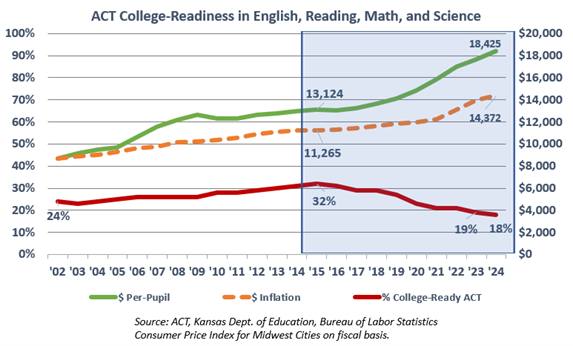Congratulations to the four newly elected members of the Kansas State Board of Education: Betty Arnold, Beryl New, Connie O’Brien, and Debby Potter. You were elected with a D or an R next to your name, but we hope you will retire those labels and adopt the only one that matters: student-focused.
Student-focused state school board members are constitutionally and statutorily charged with setting high standards and improving student outcomes. The standards (what students are expected to know and be able to do to qualify as proficient) are pretty good. Unfortunately, achievement levels are nowhere near what students need and deserve.
Only 18% of the 2024 Kansas graduates who took the ACT exam were college-ready in English, Reading, Math, and Science. That’s a tragic decline from 32% in 2015, and the future likely holds more of the same, with nearly half of 10th-graders below grade level in math and one-third below grade level in English language arts.

We hope you and the other six board members agree that this is not a time to point fingers but to hold everyone responsible for implementing the changes needed to turn this around.
Nothing can get in the way of improving student outcomes. That includes controversial social issues, which, while critically important to parents, are the purview of local school boards. They play a vital role in raising proficiency levels, and it is their responsibility to do so while representing the views of their communities.
Keep your focus on holding local school boards accountable for improving student achievement levels.
- Two state audits show that school administrators are not using at-risk funding to provide extra services to students at risk of failing. You can fix that by stripping accreditation from districts that don’t spend all their at-risk funding as state law requires.
- The current and proposed accreditation models do not require measurable performance improvement as legally required; accreditation is routinely granted to districts with declining outcomes. Require specific improvement for accreditation.
- Proficiency in reading and math (Levels 3 & 4 on the state assessment) is in the low 30s, which is far below the State Board’s 75% goal. You can incentivize improvement by making accreditation conditional for attaining district-specific proficiency improvements.
- Teachers know what needs to be done differently, but many superintendents will not allow them to share their ideas with local school board members. You can remove bureaucratic impediments by requiring districts to fully comply with the state law that says school board members “shall conduct” annual needs assessments in each school.
Assistance available to the State Board of Education
Our Kansas School Board Resource Center is helping local school board members engage with teachers and their communities, and they are often shocked at what they hear. In one case, all but one teacher in an elementary school said they don’t know how to teach kids to read because they didn’t get the science of reading training in college. Teachers in another district had their request for reading training rejected as being too expensive.
Community members, teachers, and even students tell board members that achievement levels are unacceptably low. State school board members can set an example for local boards by acknowledging the student achievement crisis.
Prove the critics wrong and say you have no interest in revisiting the science standards debacle of 20 years ago or engaging in culture wars. Students are counting on you to be the adults in the room and lead the transition to a laser focus on dramatically improving student outcomes.





